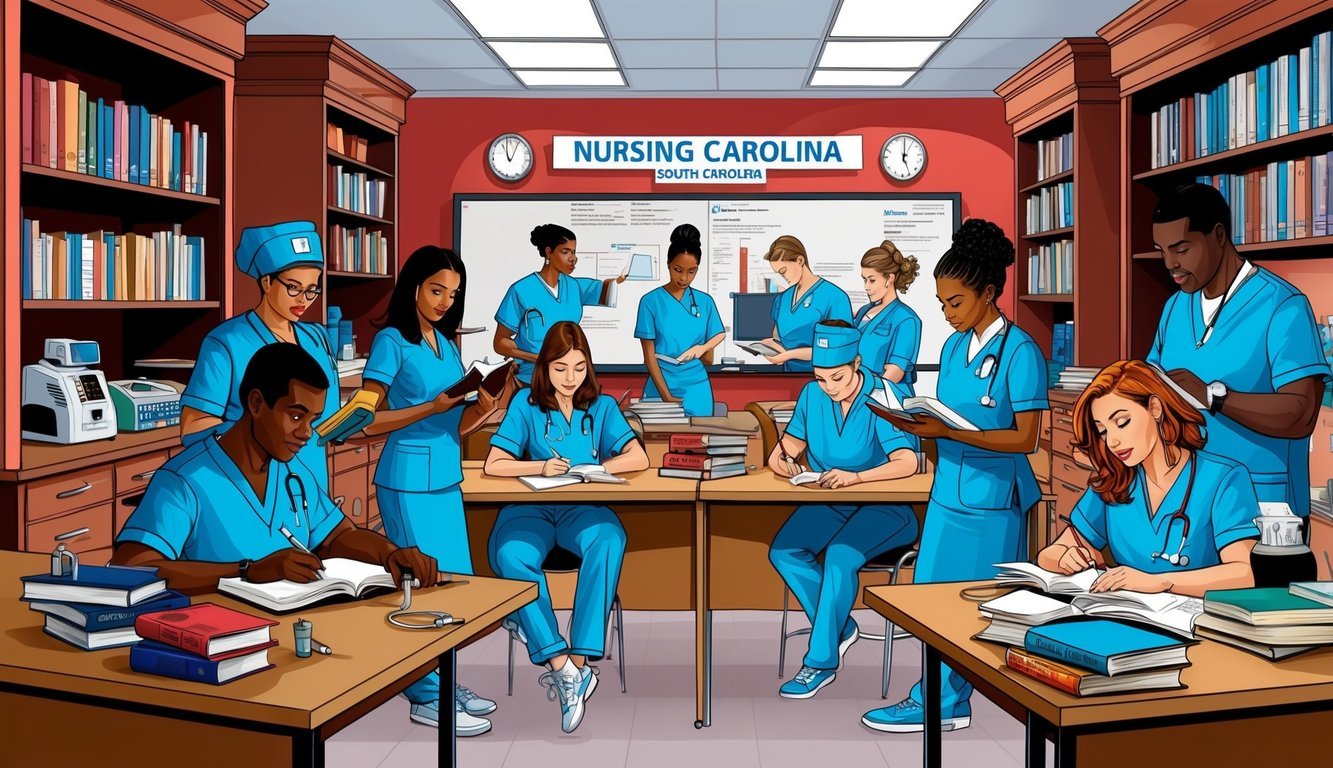Nursing school in South Carolina offers a wealth of opportunities for aspiring healthcare professionals.
With a variety of programs available, you can choose the path that best fits your career goals.
Whether that’s earning an Associate Degree in Nursing (ADN), a Bachelor of Science in Nursing (BSN), or even pursuing advanced degrees, you have plenty of options to consider. The state is home to several top-ranked nursing programs that prepare you for a rewarding career as a registered nurse.
As you explore nursing education options, consider the benefits of studying in South Carolina.
Programs often provide hands-on training, access to modern simulation labs, and robust clinical experiences that enhance learning.
Schools like the College of Nursing at the University of South Carolina and MUSC College of Nursing are recognized for their commitment to developing skilled nursing professionals who can meet the demands of the healthcare system.
Understanding NCLEX pass rates, program tuition, and admission requirements will be essential as you make your decision.
Resources like Nurse.org provide valuable insights into the best nursing schools in South Carolina, ensuring you have the information needed to embark on a successful nursing career.
Accredited Nursing Programs in South Carolina

South Carolina offers several accredited nursing programs that provide quality education and preparation for various nursing careers.
These institutions are recognized for their rigorous curricula and commitment to excellence in nursing education.
University of South Carolina College of Nursing
The University of South Carolina’s College of Nursing is known for its robust academic programs.
It offers various degrees, including the Bachelor of Science in Nursing (BSN) and a Doctor of Nursing Practice (DNP).
The program is accredited by the Commission on Collegiate Nursing Education (CCNE), ensuring that it meets high-quality education standards.
Key features include:
- Simulation Lab: State-of-the-art simulation facilities.
- Clinical Partnerships: Collaborations with local hospitals for hands-on experience.
- Flexible Scheduling: Options for full-time and part-time study.
Graduates are well-equipped for licensure and career opportunities across the state.
More information is available here.
Clemson University School of Nursing
Clemson University’s School of Nursing stands out for its comprehensive nursing education and research opportunities.
The school offers a traditional BSN program along with RN-BSN and ABSN options.
Accredited by the CCNE, the program emphasizes evidence-based practice and critical thinking.
Highlights include:
- Innovative Curriculum: Incorporates technology and advanced practices.
- Research Opportunities: Focus on nursing research initiatives.
- Student Support: Robust mentorship programs for nursing students.
The strong emphasis on community service prepares students for diverse healthcare settings.
More details can be found here.
Medical University of South Carolina
The Medical University of South Carolina (MUSC) features a long-standing reputation as the country’s second-oldest nursing school.
It offers a range of nursing degrees, including DNP and accelerated BSN programs.
Recognized for excellence, MUSC’s nursing programs are also CCNE accredited.
Notable aspects are:
- Top Rankings: Programs ranked highly by U.S. News & World Report.
- Interprofessional Education: Opportunities to collaborate with other healthcare disciplines.
- Community Engagement: Involvement in local health initiatives.
The university’s Center of Excellence in Nursing Education enhances its commitment to quality nursing education.
For more information, visit MUSC Nursing.
Anderson University
Anderson University’s nursing program is designed to prepare students through a Christian worldview.
The program offers a BSN that is fully accredited by the CCNE.
Anderson’s approach combines academic rigor with ethical considerations in healthcare practice.
Key features include:
- Personalized Learning: Small class sizes allow for individual attention.
- Clinical Practice: Leveraging community partnerships for real-world experience.
- Spiritual Emphasis: Incorporates faith-based practices into nursing education.
The program supports students in becoming competent and compassionate nursing professionals.
More information can be accessed here.
Licensing and Certification in Nursing

Obtaining the necessary licensing and certifications is essential for your nursing career in South Carolina.
This process includes preparing for the NCLEX-RN exam, understanding the requirements set by the South Carolina Board of Nursing, and exploring advanced practice licensure options.
NCLEX-RN Preparation
To become a registered nurse in South Carolina, you must pass the NCLEX-RN examination.
This exam evaluates your knowledge and skills in various nursing domains.
- NCLEX Pass Rate: South Carolina typically sees a pass rate around 85% for first-time test takers. It is important to prepare thoroughly to meet the standards.
Resources for preparation include review courses and practice tests, which can enhance your readiness.
Many schools offer specific training programs aimed at honing the skills needed for this pivotal exam.
Ensure you are familiar with the test structure, including the types of questions and the number of items, to maximize your chances of success.
South Carolina Board of Nursing Requirements
The South Carolina Board of Nursing oversees nursing licensure and requires you to meet several criteria:
- Educational Prerequisites: You must graduate from an accredited nursing program.
- Application Submission: Complete the application for licensure by examination, including the necessary fees and documentation.
- Background Check: Undergo a criminal background check.
Once these steps are accomplished, you can register for the NCLEX-RN exam.
Keeping track of any changes in regulations is vital, as requirements may evolve.
For more detailed information, refer to the South Carolina Board of Nursing’s website here.
Advanced Practice Registered Nurse (APRN) Licensure
If you aim to pursue a higher level of nursing, consider licensure as an Advanced Practice Registered Nurse (APRN).
This pathway allows you to specialize in fields such as nurse practitioner, nurse anesthetist, and clinical nurse specialist.
The APRN licensure requires:
- Master’s Degree: A graduate-level nursing program that is accredited.
- National Certification: Obtain certification from a recognized national organization, such as ANCC.
- Supervised Practice: Complete a certain number of hours in a clinical setting.
Understanding the specific requirements is crucial, as they can vary depending on your chosen specialty.
You can find more information on APRN requirements through resources provided by the South Carolina Board of Nursing.
Financial Aid and Scholarships for Nursing Students

Navigating the financial aspects of nursing school can be challenging.
Understanding the various financial aid options and scholarship opportunities available in South Carolina can alleviate some of the burdens associated with funding your education.
Assessing Financial Aid Options
When considering nursing school in South Carolina, it’s crucial to explore diverse financial aid options.
These may include federal, state, and institutional aid.
You can typically access these funds by completing the Free Application for Federal Student Aid (FAFSA).
- Federal Aid: This includes Pell Grants, work-study programs, and federal student loans. Eligibility is determined based on your financial need.
- State Aid: South Carolina offers specific scholarships and grants for residents pursuing nursing. Eligibility usually requires meeting GPA and enrollment criteria.
Visit Nursing Scholarships in South Carolina for a detailed list of available financial resources.
Scholarships for Future Nurses
There are numerous scholarships specifically designed for nursing students in South Carolina.
These awards can significantly reduce your educational costs and do not need to be repaid.
Some prominent options include:
- Carolina Children’s Home Foundation: Offers scholarships up to $10,000 for students residing in certain counties.
- College of Nursing Scholarships: Various scholarships are available through institutions like MUSC and the University of South Carolina for students with a GPA of 3.0 or higher.
Apply early and keep an eye on deadlines for these scholarships.
For a comprehensive guide on scholarship opportunities, check MUSC Financial Aid and Scholarships.
Free Application for Federal Student Aid (FAFSA)
Completing the Free Application for Federal Student Aid (FAFSA) is a key step in securing financial aid.
This form allows you to access federal, state, and institutional funding tailored for your situation.
- Eligibility: Open to U.S. citizens and eligible non-citizens attending college.
- Process: Fill out the FAFSA online, providing your financial information. This will determine your Expected Family Contribution (EFC).
Be sure to check the application deadlines to maximize your financial aid potential.
More details about the FAFSA can be found at FAFSA Official Website.
Professional Development and Continuing Education
Professional development and continuing education are vital for advancing your nursing career in South Carolina.
Engaging in targeted educational programs enhances your skills, promotes leadership, and prepares you for specialized roles within the healthcare system.
Leadership and Management in Nursing
In nursing, strong leadership and management skills are essential.
Continuing education programs focus on developing these competencies, equipping you with the ability to effectively lead teams and manage healthcare settings.
Courses in leadership often cover topics like conflict resolution, team dynamics, and strategic planning.
You may also explore advanced degrees such as a Master of Science in Nursing (MSN) or a Doctor of Nursing Practice (DNP), which can further enhance your qualifications and salary potential.
To succeed in leadership roles, consider certifications like the Nurse Executive Certification.
Resources like the South Carolina AHEC provide valuable training programs to help you get started.
Specialized Nursing Fields and Further Education
Specializing in a nursing field can significantly enhance your career prospects.
Areas like public health, palliative care, and nursing research are in high demand.
Pursuing further education through specialized training programs can prepare you for these roles.
For instance, obtaining certification as a Nurse Practitioner opens doors to advanced practice opportunities.
You might explore continuing education courses through platforms like Elite Learning, which offers various accredited programs.
Participating in specialized training allows you to stay updated on the latest healthcare trends and practices, ensuring your skills remain relevant and effective in your field.
Clinical Experience and Patient Care Training
Clinical experience is a vital aspect of nursing education, providing you with the skills necessary for effective patient care.
Through hands-on clinical rotations and simulation labs, you prepare to meet real-world challenges in healthcare settings.
Hands-On Clinical Rotations
During your nursing program, you will participate in clinical rotations that offer direct patient care experiences.
These rotations take place in various healthcare facilities, allowing you to work alongside experienced healthcare providers.
Typically, you will complete critical clinical hours necessary for your degree, gaining exposure to different specialties such as:
- Medical-surgical nursing
- Pediatrics
- Psychiatric nursing
- Geriatrics
This hands-on experience is crucial for developing your skills in patient assessments, communication, and implementing treatment plans.
Simulation Labs and Evidence-Based Care
Simulation labs provide a controlled environment where you can practice essential nursing skills.
These labs use advanced technology to replicate real-life scenarios, enabling you to learn techniques in a safe setting.
You’ll engage in:
- Patient simulations to mimic emergencies
- Skill practice for administering medications
- Team-based scenarios that enhance collaboration
Additionally, you will focus on evidence-based care, integrating research and clinical expertise to optimize patient outcomes.
This emphasis on evidence supports your decision-making and prepares you to deliver high-quality care.
Familiarity with contemporary practices enhances your ability to serve as a compassionate nurse dedicated to patient wellness.

